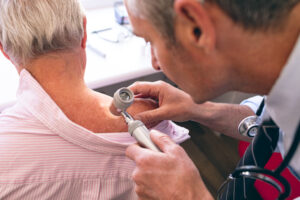Veterans often face unique challenges related to orthopedic injuries sustained during their service. In this Q&A session, Leah addresses questions from veterans, especially those related to orthopedic and veterans disability issues.

1. Orthopedic Injuries and Paratrooping
As a paratrooper, one veteran inquires about the possibility of connecting a compression fracture in the back to a jump and cervical neck problems. Leah shares her perspective, emphasizing the well-known fact that paratrooping imposes strains on the body, particularly during static line parachuting. She encourages the veteran to pursue a disability claim if they believe their injury is related to their service and recommends seeking a medical opinion from the treating provider, taking into account post-service injuries and experiences.
Key Takeaway: Paratrooping is associated with orthopedic injuries, making it crucial for veterans to explore disability claims for conditions resulting from their service.
2. Orthopedic Challenges: Knees, Hips, and Disc Bulge
Another veteran presents a complex case involving service-connected issues with both knees, hip problems (DJD), and disc bulges in the lumbar spine. Leah acknowledges the interconnectedness of these orthopedic conditions and highlights the importance of considering risk factors. She underscores the role of documented evidence, such as medical records, to support disability claims.
Key Takeaway: Veterans with interconnected orthopedic issues should carefully document their conditions and seek professional assistance from accredited legal professionals when navigating disability claims.
3. Aggravation of Pre-existing Conditions
A veteran seeks clarification on the concept of aggravation, specifically regarding pes planus (flat feet). Leah explains that aggravation refers to the worsening of a pre-existing condition due to military service or another service connected disability. She emphasizes the need for a baseline assessment of the disability, distinguishing between causative and aggravational factors. Weight gain and other stressors can contribute to the aggravation of pre-existing conditions.
Key Takeaway: It is often important to consider a clear baseline for pre-existing conditions and demonstrate how military service aggravated these conditions to support disability claims.
4. Documentation of Pes Planus
A veteran shares that a podiatrist documented pes planus as due to injury, not congenital. Leah delves into the nuances of this situation, questioning the nature of the injury that led to the flat foot. She emphasizes the importance of understanding whether the condition was congenital or acquired during military service. Leah advises the veteran to explore further medical opinions and documentation to strengthen their disability claim.
Key Takeaway: Accurate documentation of the origin of orthopedic conditions is crucial, and veterans should seek additional medical opinions when needed.
5. Clarifying Aggravation Concept
The veteran seeks further clarification on aggravation, questioning the documentation of pes planus as an injury rather than congenital. Leah advises the veteran to discuss this with the veterans treating doctor to delve into the details of the documented injury and emphasizes the need to establish a clear link between military service and the worsening of the condition.
Key Takeaway: Veterans should thoroughly understand the aggravation concept and be prepared to provide comprehensive evidence linking their military service to the worsening of pre-existing conditions.
Conclusion
Navigating orthopedic disability claims as a veteran can be complex, and seeking expert legal advice from veterans service officers, accredited claims agents, or attorneys can be essential. Leah’s insights in this Q&A highlight the importance of accurate medical documentation, understanding aggravation, and obtaining professional opinions to strengthen disability claims. Veterans are encouraged to leverage this information as they pursue the compensation and support they deserve for orthopedic issues stemming from their dedicated service.
Also read: Central Sleep Apnea and Traumatic Brain Injury in Veterans Disability
At Prestige Veteran Medical Consulting, a veteran-owned company, we specialize in Independent Medical Opinions (IMOs) known as Nexus letters.
Our purpose is to empower YOU, the veteran, to take charge of your medical evidence and provide you with valuable educational tools and research to guide you on your journey.
Understanding the unique challenges veterans face, our commitment lies in delivering exceptional service and support.
Leveraging an extensive network of licensed independent medical professionals, all well-versed in the medical professional aspects of the VA claims process, we review the necessary medical evidence to incorporate in our reports related to your VA Disability Claim.
Prestige Veteran Medical Consulting is not a law firm, accredited claims agent, or affiliated with the Veterans Administration or Veterans Services Organizations. However, we are happy to discuss your case with your accredited VA legal professional.













